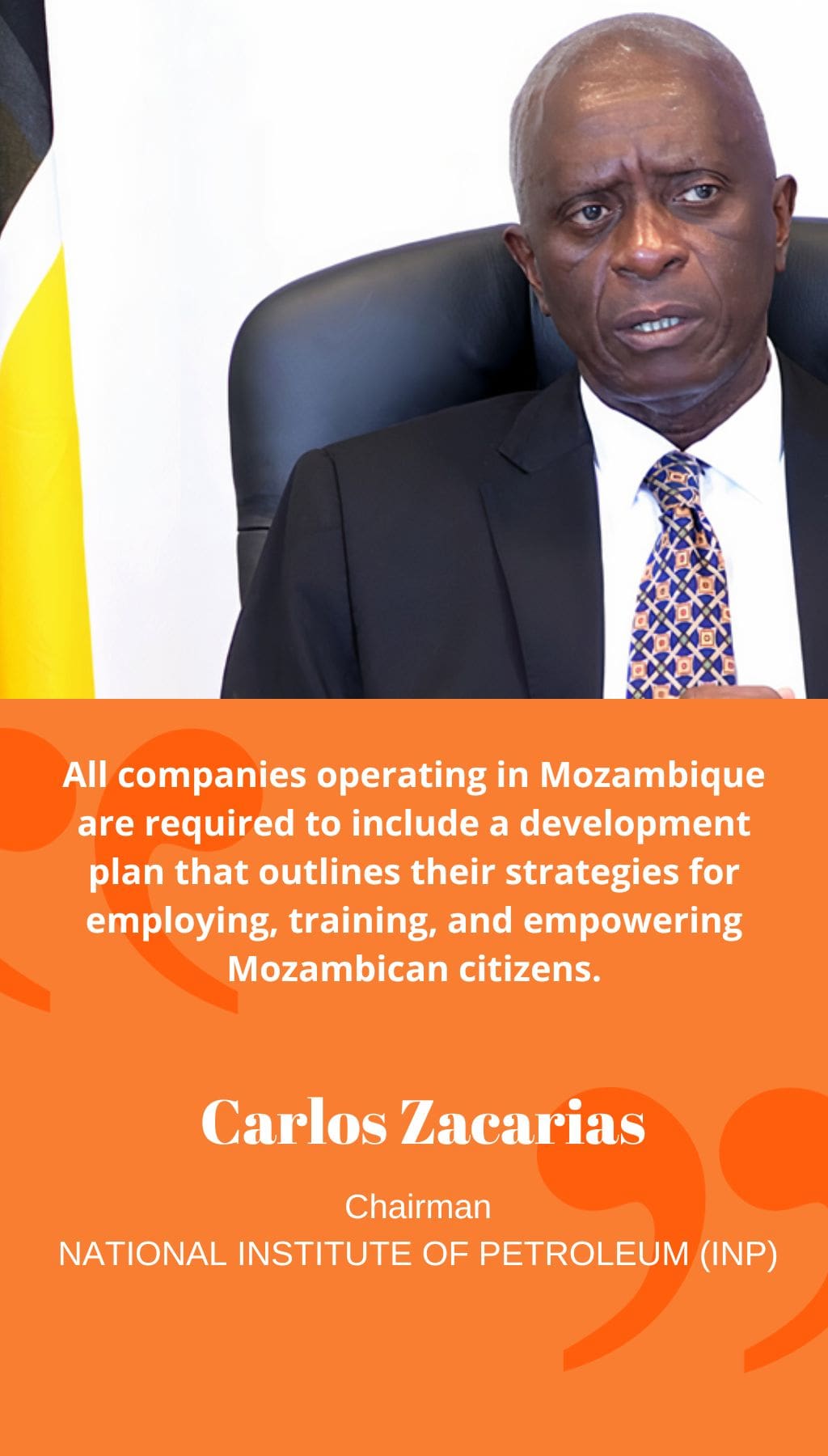
- Mozambique | 21 October 2020

What is the mandate of the INP (Instituto Nacional de Petróleo) in Mozambique?
The INP is a public institution with patrimonial, financial, and administrative autonomy. It was established in 2004 as the regulatory body for the petroleum upstream sector in Mozambique. Our mandate covers the entire upstream value chain, which includes activities such as promotion, licensing, contract negotiation, contract monitoring, research, production, and development of the petroleum sector. We also oversee processes related to gas processing, liquefaction, and transportation.
How has the upstream sector in Mozambique evolved since the establishment of the INP?
Initially, the INP was a relatively small institution primarily focused on managing the Pande and Temane gas fields in Inhambane province. These fields, operated by the South African company Sasol, began production in 2004. Although this was the only ongoing project with limited gas reserves at the time, the Ministry of Energy and Mineral Resources (MIREME) believed that Mozambique had greater potential for hydrocarbon exploration in other areas of the country. We worked diligently to attract foreign investments and in 2005, we launched a tender for licensing areas in the Rovuma Offshore Basin. This tender attracted international oil companies such as Anadarko, Eni, Artumas, and Norsk Hydro (now Statoil/Equinor). In 2010, Total (formerly Anadarko) made the first discovery at the Windjammer field, followed by significant findings in Area 1 and Area 4, including the Mamba and Coral fields, made by Eni. The 2020 marks the 10th anniversary of these discoveries, which represent a historic and scientific milestone in the development of Mozambique’s petroleum sector. These discoveries were considered among the most important gas finds in recent years. In 2014, a Decree Law was approved to facilitate the development of the Rovuma LNG projects. However, due to market conditions and a decline in petroleum prices in 2014, project timelines were affected. To ensure overall progress, we decided to advance three projects: the Floating LNG (FLNG) plant in Coral Sul operated by Eni, the Golfinho-Atum project led by Total, and the Rovuma LNG project in Area 4 led by MRV (ENI, ExxonMobil, and CNPC). Initially estimated at USD 10-15 billion, the combined investments of these three plants now amount to USD 50 billion, which will transform Mozambique’s economy within a few years.
What is the timeline for implementing the projects in the Rovuma Basin?
The construction of the FLNG plant for the Coral Sul field is currently underway in South Korea. If everything proceeds as planned, the platform will be transported to Mozambique by the end of 2021, and production is expected to commence by the end of 2022. The Golfinho-Atum project has recently commenced, and the contracted companies are already operating in the field. Production is anticipated to start by the end of 2024. As for the Rovuma LNG project, the timeline for work will be determined once the final investment decision is announced, expected by mid-2020. First production from this project is projected for 2025. The expected production output from these projects is 3.3 million tons from Coral Sul, 12 million tons from Golfinho-Atum, and 15 million tons from Rovuma LNG. These developments will transform Mozambique from a small producer to a major global exporter of liquefied gas.
With production commencing in the Rovuma Basin, what is the future of the Pande and Temane fields?
The projects in Pande and Temane are designed with a lifespan of 25 years. 2020 marks the 16th year of production for Pande and Temane, and as the project has reached its peak, production is expected to gradually decrease if no new gas reserves are added. However, the existence of gas and hydrocarbon resources is not limited to a single area; it is a regional characteristic. Therefore, investments have been made to explore other reserves in the vicinity, which could potentially extend gas production in the area. It’s worth noting that these findings are not as significant as Pande and Temane and will only represent a fraction of the output from the Rovuma Basin. Currently, Pande and Temane fields produce approximately 150 million gigajoules (GJ) of gas, with 30% allocated for local consumption and the remaining exported to South Africa.
What are the prospects for gas discoveries in other offshore areas of Mozambique?
Following the discoveries in the Rovuma Basin, we have been assessing the country’s potential in other areas. Contracts have been signed for areas in Angoche (5A and 5B) and Zambesi (5C and 5D), with ExxonMobil operating Angoche 5B and Zambezi 5C and 5D (in partnership with Rosneft, Qatar Petroleum, and ENH) and ENI operating Angoche 5A (with Sasol, Qatar Petroleum, and ENH). This assessment is currently underway, and we expect exploration wells to be drilled next year. Based on our assessment, there is a possibility of discovering additional gas resources in these areas.
How does the INP promote transparency and local content in the petroleum sector?
Transparency is a key focus for the INP, and we make every effort to ensure it. We publish all our contracts on our official website, allowing public access to this information. We also disclose and advertise various data related to reserves, production, financial gains, cost controls, and other relevant aspects of the sector. Regarding local content, it is a vital aspect prioritized by the government. The Gas Master Plan emphasizes the use of these resources to drive the country’s industrial development. The petroleum laws include provisions that stipulate a specific amount of petroleum or gas resources to be utilized for the national market. For the Rovuma projects, this amounts to approximately 900 million cubic feet per day. Furthermore, the true value of the gas industry lies in generating employment opportunities, fostering partnerships between local and foreign companies, and promoting the growth of the local economy. All companies operating in Mozambique are required to include a development plan that outlines their strategies for employing, training, and empowering Mozambican citizens.














